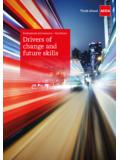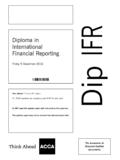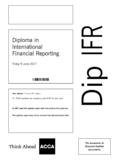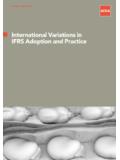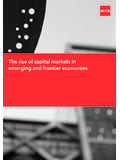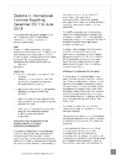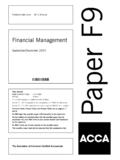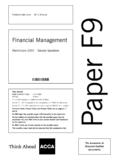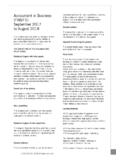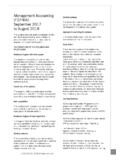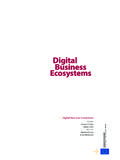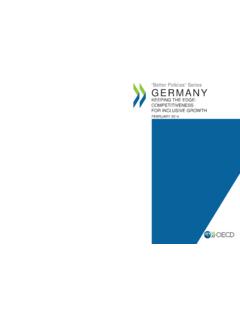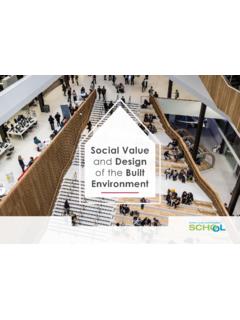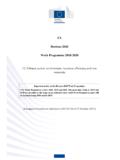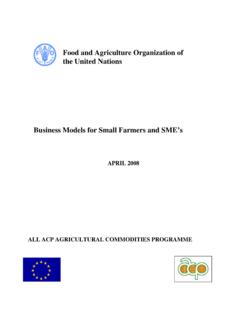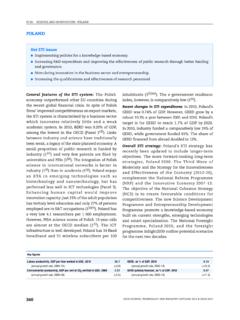Transcription of Environmental Aspects of Sustainability: SMEs and …
1 Environmental Aspects of sustainability : smes and the Role of the AccountantResearch report 128 Environmental Aspects of sustainability : smes and the Role of the AccountantProfessor Laura J. SpenceProfessor of Business EthicsDirector, Centre for Research into sustainability ,School of Management, Royal Holloway, University of London Dr Gloria AgyemangSenior Lecturer in AccountingCentre for Research into SustainabilitySchool of Management, Royal Holloway, University of LondonDr Leonardo RinaldiLecturer in AccountingCentre for Research into SustainabilitySchool of Management, Royal Holloway, University of LondonCertified Accountants Educational Trust (London), 2012 ISBN: 978-1-85908-479-3 The Association of Chartered Certified Accountants, 2012 ACCA s international research programme generates high-profile, high-quality, cutting-edge research.
2 All research reports from this programme are subject to a rigorous peer-review process, and are independently reviewed by two experts of international standing, one academic and one professional in practice. The Council of the Association of Chartered Certified Accountants consider this study to be a worthwhile contribution to discussion but do not necessarily share the views expressed, which are those of the authors alone. No responsibility for loss occasioned to any person acting or refraining from acting as a result of any material in this publication can be accepted by the authors or publisher. Published by Certified Accountants Educational Trust for the Association of Chartered Certified Accountants, 29 Lincoln s Inn Fields, London WC2A would like to thank the following from ACCA for their energetic support in the development and execution of this project: Rosana Mirkovic (senior policy adviser), professor Robin Jarvis (head of SME affairs), Rachel Jackson (head of sustainability ) and Cecilia Thorne (former senior policy advisor).
3 We are grateful to the project advisers for their sensible counsel: professor Brendan O Dwyer, Amsterdam Business School, University of Amsterdam, the Netherlands; professor Peter Hasle, National Research Centre for The Working Environment, Denmark; professor Paul Robson, School of Management, Royal Holloway, University of London. We particularly extend our thanks to the participants in this research Aspects OF sustainability : smes AND THE ROLE OF THE ACCOUNTANT ContentsGlossary 4 Executive summary 51. Introduction 82. Previous research 93. Research methods 144. Findings 155.
4 Discussion and recommendations 27 References 31 Appendix 1: Interview guide for SMPs 34 Appendix 2: Resources on Environmental sustainability 354 GlossaryDEFRA (Department for Environment, Food and Rural Affairs): UK government department that makes policy and legislation, and works with other bodies to carry out its policies in areas such as the natural environment, biodiversity, plants and animals, sustainable development and the green economy, food, farming and fisheries, animal health and welfare, Environmental protection and pollution control, and rural communities ( ). Environmental Envisaged as a long-term perspective that aims to ensure that economic activity can progresssustainability without damaging the Government programme that aims to help businesses implement resource-efficient practices in order to cut costs, increase profit, and benefit the environment.
5 Now part of WRAP ( ).EMAS (Eco-Management and Audit Scheme): voluntary management tool available for organisations aiming to improve their Environmental and financial performance and communicate their Environmental achievements to stakeholders and society in general. Currently, more than 4,500 organisations and approximately 7,800 sites are EMAS registered in ( Environmental Management System): refers to a management tool for improving Environmental performance. It addresses the management of an organisation s Environmental impacts in a systematic, planned and documented way. It includes the administrative structure, the planning and sourcing for developing, implementing and maintaining policy for protection of Environmental (Federation of Small Businesses): UK s largest campaigning pressure group promoting and protecting the interests of the self-employed and owners of small firms ( ).
6 GRI (Global Reporting Initiative): non-profit organisation that promotes economic, Environmental and social sustainability . GRI provides all companies and organisations with a comprehensive sustainability reporting framework that enables them to measure and report their economic, Environmental , social and governance performance. The GRI framework has now reached its third update and is widely used around the world ( ).ISO14001 International voluntary standard and guidance document to help organisations address Environmental issues. ISO14001 sets out how a business can go about putting in place an effective Environmental management system (EMS) (qv), describing its specific requirements. ISO14001 is regarded as the dominant Environmental management system in the world ( essentials).
7 SME (Small and medium-sized enterprise): the category of micro, small and medium-sized enterprises ( smes ) is made up of enterprises that employ fewer than 250 persons and that have an annual turnover not exceeding 50 million euros (about 42 million), and/or an annual balance sheet total not exceeding 43 million euros (about 36 million).SMP (Small and medium-sized accountancy practice): an SME accounting practice whose clients are mostly smes that use external sources to supplement limited in-house technical resources, and contain a limited number of professional In a broad sense this represents the aptitude for endurance. For human beings it is the potential for long-term maintenance of well-being of the current and future inhabitants of the Earth, which implies the alleviation of poverty and starvation, and comprises the well-being of the natural world and the responsible use of natural resources ( ).
8 WRAP (Waste and Resource Action Programme): not-for-profit company that works in England, Scotland, Wales and Northern Ireland to help businesses and individuals reap the benefits of reducing waste, developing sustainable products and using resources in an efficient way ( ).5 Environmental Aspects OF sustainability : smes AND THE ROLE OF THE ACCOUNTANTEXECUTIVE SUMMARY METHODSThis exploratory study took a broadly inductive approach to the research. The researchers undertook qualitative interviews with nine practising accountants working in SMPs as well as with three SME representatives and two Environmental consultants, to reflect alternative perspectives on the research questions. The research was primarily UK based (9 out of 14 respondents), but at the request of the funders also drew data from Canada, Hong Kong, and the Netherlands.
9 The practising accountants were all professionally qualified. KEY FINDINGSIn summary, contrary to early indications and expectations (CICA, AICPA and CIMA 2011; IFAC 2012), Environmental sustainability advice was not found to be widely provided by the SMPs in the sample. They have very limited resources on which to draw, lacking knowledge of Environmental sustainability and the confidence to use their accounting skills in this respect. They need training and education to address this, as well as access to specialist information. Key contextual factors influencing the provision of Environmental sustainability advice include the industrial sector, relevant local and national legislation and regulation, and the economic climate. The key findings include the following points.
10 Where the SMPs in the sample were offering Environmental sustainability advice to SME clients it generally pertained to cost reduction opportunities that could be identified in areas such as energy consumption, transport costs, and generic resource input reduction (eg paper). Where Environmental sustainability was being discussed between smes and their accountants, any advice tended to be ad hoc and provided only informally as part of a conversation. Resources drawn upon included: personal interest on the part of the accountant in Environmental sustainability ; very occasionally, an accountant possesses more formal training/qualifications on Environmental matters on which to draw personal experience or knowledge of other clients experience the professional and peer-based trust relationship between an SME and an SMP with a proven track record the existing multipurpose nature of SME/SMP exchanges (ie beyond straightforward accountancy/financial services).
